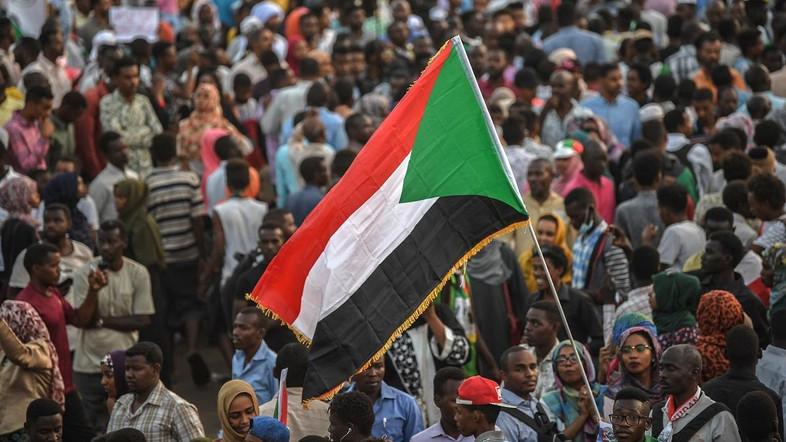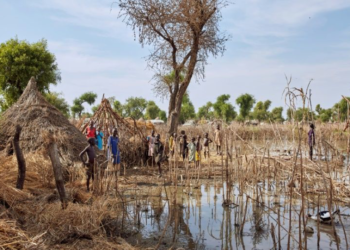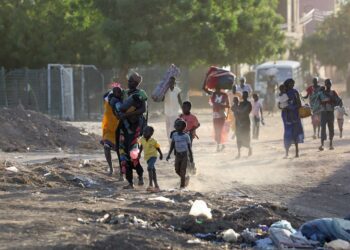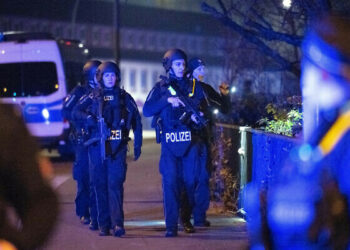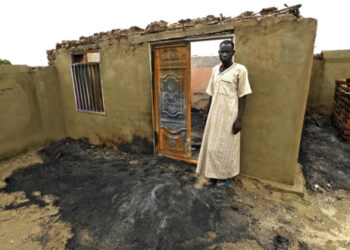Five Sudanese demonstrators including students were shot dead Monday during a rally attended by school children against a shortage of bread, a day before protest leaders and the ruling generals hold fresh talks.
The authorities announced a night-time curfew in four towns following the deaths in the central town of Al-Obeid.
The generals and protest leaders have already inked a power-sharing deal that aims to set up a joint civilian-military ruling body which in turn would install civilian rule.
That is the main demand of a nationwide protest movement that led to the April ouster of longtime leader Omar al-Bashir and has since demanded that the military council which took his place cede power to civilians.
But on the eve of Tuesday’s talks aimed at resolving the remaining issues over transferring power, five protesters including four students were killed in Al-Obeid, the capital of North Kordofan state, a doctors committee linked to the protest movement said.
Received video of one of the many Protests taking place in Sudan today as people demand civilian rule and demonstrate against Transitional Military Council #SudanUprising pic.twitter.com/Eu4p4Nfzzz
— Samira Sawlani (@samirasawlani) July 28, 2019
“Five martyrs succumbed to direct wounds from sniper bullets during a peaceful rally in Al-Obeid,” the committee said in a statement.
A key protest group, the Sudanese Professionals Association, said that “live ammunition” had been used against what it said was a student rally.
“We are calling on all citizens and medics to go to the emergency ward of Al-Obeid hospital and other hospitals that are receiving the wounded from the live ammunition fired on the rally of school students,” the group said on its Facebook page.
The office of North Kordofan’s governor said a curfew would be imposed indefinitely from 9:00 pm to 6:00 am in four towns including Al-Obeid starting on Monday, adding that all schools in the province had been told to suspend classes.
Call for Suspending Talks
Residents of Al-Obeid said the rally was against a shortage of bread and fuel in the town.
“For the past few days there has been a shortage of fuel and bread,” a resident told AFP by telephone.
“School children were affected as there is no transport to help them reach their schools. Today, they staged a rally and when it reached downtown there were shots fired.”
It was the tripling of bread prices that initially triggered protests against Bashir, which later turned into a nationwide movement.
The town of Al-Obeid had not witnessed any major rallies against Bashir even as provinces, cities and towns were swept by the campaign against his rule.
Monday’s deaths triggered calls to suspend the planned talks.
“We cannot sit at the negotiating table with those allowing the killing of revolutionaries,” Siddig Youssef, a prominent protest leader, said in a statement.
Protest leaders say Tuesday’s talks will cover issues including the powers of the joint civilian-military ruling body, the deployment of security forces and immunity for generals over protest-related violence.
The power-sharing deal already agreed on July 17 provides for the establishment of a new governing body of six civilians and five generals.
It will then oversee the formation of a transitional civilian government and parliament to govern for 39 months, after which elections will be held.
Impartial Probe
In Khartoum, demonstrators have been rallying again since Saturday, when an investigation found that security officers, including some from the feared Rapid Support Forces, carried out a deadly crackdown on a protest camp without any orders from their superiors.
Shortly before dawn on June 3, gunmen in military fatigues raided the site of the weeks-long sit-in outside the military headquarters in Khartoum, shooting and beating protesters.
Doctors linked to the protest movement say the raid left 127 people dead and scores wounded.
But the joint investigation by prosecutors and the ruling military council that took power following Bashir’s ouster found that just 17 people were killed on June 3, with a total of 87 dying between that day and June 10.
The probe identified eight officers involved in the violent crackdown on the protest camp, including three from the Rapid Support Forces.
The eight officers face charges of crimes against humanity, chief investigator Fatah al-Rahman Saeed told reporters on Saturday.
But protest leaders have rejected the findings, saying the inquiry exonerated the military council and gave a far lower death toll than their own figures.
Saeed’s investigation “was commissioned by the military council, this is challenging its integrity as the military council itself is accused in this case,” said the Sudanese Professionals Association.
Angry demonstrators have called for an independent investigation into the raid.
On Sunday, scores of protesters chanting the months-long protest movement’s catchcry of “Freedom, peace, justice!” rallied in Khartoum’s eastern Burri district, witnesses said, adding that riot police swiftly dispersed the crowd with tear gas.
The country’s ruling generals have insisted they did not order the dispersal of the sit-in.


